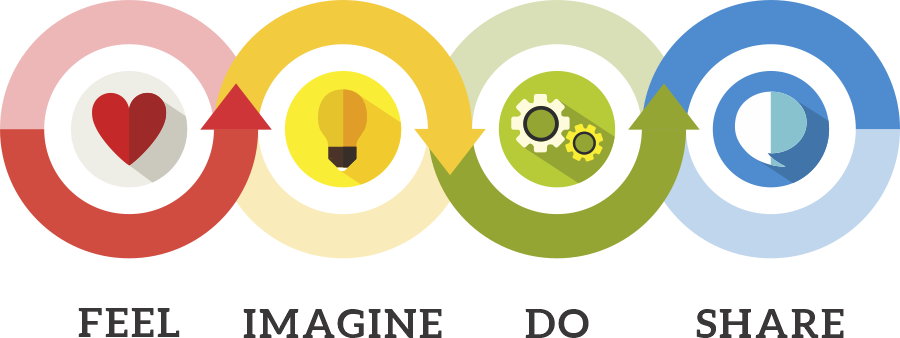How We Teach
Our approach to learning empowers your child with the skills to design a more desirable and sustainable future today. Grounded in design thinking, our curriculum combines play-based experiential learning as well as “I CAN” competencies, with a simple and proven framework of
“Feel, Imagine, Do, Share” (FIDS).
-
Providing an educational environment that emphasizes exploration and direct interaction with nature to foster curiosity and creativity in children.
-
In addition to teaching English, we place importance and prominence on teaching Arabic, our mother tongue, thus strengthening cognitive development, learning outcomes, preserving cultural identity and boosting confidence and participation. The focus on mother tongue actually facilitates learning additional languages and promotes social inclusion.
-
In addition to teaching English, we place importance and prominence on teaching Arabic, our mother tongue, thus strengthening cognitive development, learning outcomes, preserving cultural identity and boosting confidence and participation. The focus on mother tongue actually facilitates learning additional languages and promotes social inclusion.
-
Designing interactive educational activities that use play as a primary tool to develop motor, social, and cognitive skills.
-
Focusing on academic, emotional, and social development through a curriculum that integrates strong educational content with value-based learning.
-
Providing indoor and outdoor learning spaces that support the needs of all children, regardless of their abilities or learning styles.
-
Through our unique ICAN Approach to learning, we place the child at the center of the education system and nurture their innate ability to say “I CAN”.
-
At Aef, we ensure an inclusive educational setting that offers the best services and support for children with special needs, adapting programs and activities to help them grow and develop.
-
Creating opportunities for children to make decisions and experiment with new ideas, helping them develop strong and independent personalities.
-
Promoting teamwork and collaboration among children to develop communication skills and positive conflict resolution.
-
Teaching children the importance of environmental conservation and promoting sustainable practices in their daily lives.
-
Encouraging children to solve problems creatively using design thinking principles and self-exploration; hence building and strengthening student agency and initiative.
-
to help our children develop into resilient, confident, and emotionally intelligent individuals. Early guidance in these skills lays a strong foundation for lifelong emotional health, academic success, and positive social interactions.
-
to children helps them develop into resilient, confident, and emotionally intelligent individuals. Early guidance in these skills lays a strong foundation for lifelong emotional health, academic success, and positive social interactions.

What is the I CAN Approach?
At the heart of the I CAN Approach is a simple yet powerful philosophy: putting the child at the center of the education system and nurturing their innate ability to say “I CAN”.
This approach empowers learners of all ages to embrace a “both-and” mindset—balancing content and character, passion and compassion, and doing good while doing well. By instilling the belief “I CAN,” every child gains the agency to drive positive change and prepares to become a responsible, HumanE citizen of the world.
Alef School of Nature becomes the first school in Jordan powered by The Riverside I CAN Approach — a globally recognized, tried and tested model pioneered at The Riverside School, India, and supported by RLC to nurture HumanE, ethical, and empowered learners. Riverside Learning Center (RLC) is the pedagogical research and training arm of the award-winning Riverside School, Ahmedabad. With a presence in over 11 countries, RLC partners with educators, school leaders, governments, and school founders to design and implement purpose-driven learning ecosystems rooted in student agency. Through the I CAN Approach and its foundational Design-led framework (FIDS for KIDS), RLC empowers institutions to build cultures where every child graduates with an ‘I Can Mindset’. Alef School in Nature has been trained on these processes since September of 2025 , and continues to implement RLC methodologies to build a culture of student agency and purposeful learning.
Alef Superheroes

Why Design for Change?
Employing design thinking in schools helps children develop critical skills such as creativity, empathy, and problem solving. It encourages them to think innovatively, work collaboratively, and approach real-world challenges with confidence and curiosity. By learning to understand others’ needs and test their ideas, students become more engaged, thoughtful, and better prepared for the future.
Design for Change Jordan
Design for Change brings the Design Thinking framework of FEEL, IMAGINE, DO, and SHARE ™ (FIDS FOR KIDS) into classrooms. Applying this to children as young as 4 years of age facilitates in solving day to day problems they face as individuals, as a family, or as a community.





